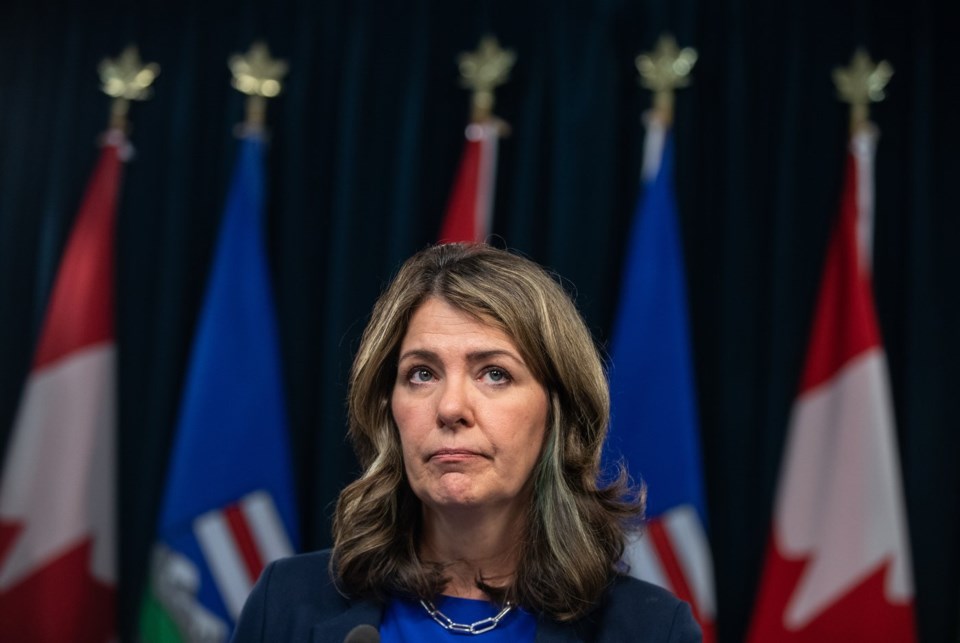EDMONTON — Alberta Premier Danielle Smith is fighting criticism she's being selfish and dangerous by risking a separation referendum in part to avert the emergence of a political rival.
Smith says she doesn't support separating her province from Canada, but says Albertans have genuine grievances with the federal government, and she wants concessions from Liberal Prime Minister Mark Carney.
On Thursday in question period in the legislature, Opposition NDP Leader Christina Gray said Smith's own words show she is jeopardizing national unity to bolster her own power.
"Why is the premier dividing the country and our province just to avoid dividing her party?"
The day before, Smith was asked on CTV ĂŰĚŇĘÓƵapp Channel if it wasn't easier to quell separatism by taking it off the table.
Smith responded, “If there isn’t an outlet, it creates a new party.”
In the legislature, Smith said she doesn't want to see the Alberta separatist movement grow into a large, mainstream political party like the Bloc Québécois or Parti Québécois in Quebec.
"We do not want a permanent feature of Alberta politics to be parties that send representatives to Ottawa whose sole purpose is to break up the country," she said.
Smith added that she's working to gain respect for Alberta within a united Canada, but Gray said the separatists the premier referred to are factions of her own party.
Smith's United Conservative Party is the amalgamation of two right-wing parties that joined in 2017 to win power from then-New Democrat premier Rachel Notley in 2019.
The pro-independence Republican Party of Alberta, formerly called the Buffalo Party, which does not have an elected member of the legislature, pushed back against Smith's remarks on social media, saying their party is gaining momentum and won't back down.
"We welcome debate, but we will not be dismissed. The people of this province deserve more than political maneuvering; they deserve leadership that puts Alberta above party loyalty and above Ottawa's interests," a statement said.
Last week, after Carney's election win, Smith's government introduced a bill that would sharply lower the bar for citizens seeking to trigger provincewide referendums.
That sparked renewed grassroots efforts in Alberta to gather support for seceding from the country.
Smith has said she wants to enable direct democracy on a wide range of Albertans' concerns and, should there be enough signatures, she has promised to initiate a separation referendum as early as next year.
First Nations chiefs from across Alberta have condemned Smith's legislation as well as any suggestion of Alberta separation, warning their treaties with the Crown predate the province and Alberta doesn't have the authority to challenge those agreements.
Smith has said her aim is to compel the Liberals to end federal policies that have long irritated her province, including by demanding guaranteed oil and gas pipeline access to tidewater.
Her approach includes sending a negotiating team to Ottawa, while at the same time hosting town halls to gather feedback from Albertans on how to get a better deal.
After a meeting with Carney and her provincial counterparts, Smith said in a statement Wednesday there's an emerging consensus among premiers that federal regulations need to be cleared away to allow for "nation-building projects" and investment.
"I expect to see meaningful action from Prime Minister Mark Carney and the federal government to remove the restrictive policies and barriers that have landlocked our resources and hampered our economy for the past decade," she said.
Other provincial leaders have also weighed in on the rise of separation talks.
New Brunswick Premier Susan Holt said Thursday her fellow premiers recognized Smith is facing "discontent" from her constituents, but Carney has made it clear he is interested in projects that get resources moving east and west to new markets.
"There is opportunity to move ahead while Premier Smith does what she feels she needs to do with the population that she's responsible to govern," she said.
At the same time, Holt said in the face of U.S. President Donald Trump's tariff trade war, the country needs to stand together.
"Now is the time for Canada to be unified and aligned in the face of that kind of economic threat from our largest trading partner," she said.
That echoed previous comments from Ontario Premier Doug Ford, who has also said he is a "big proponent" of building pipelines across the country, and that he supports the people of Alberta who feel like they've been ignored by Ottawa.
Parti Québécois Leader Paul St-Pierre Plamondon has stood up for Smith, saying she is defending her province's autonomy.
-- With files from Hina Alam in New Brunswick
This report by The Canadian Press was first published May 8, 2025.
Lisa Johnson, The Canadian Press




